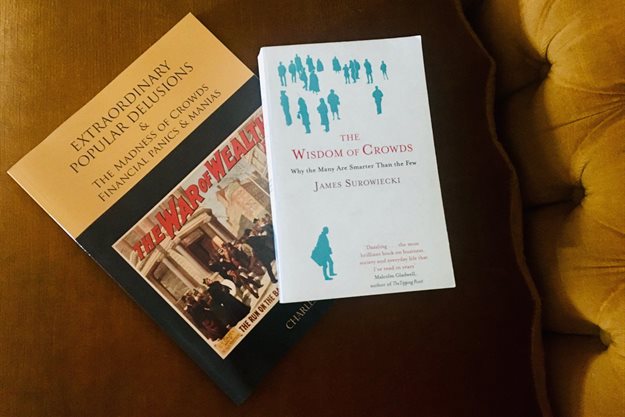#PulpNonFiction: Wisdom or made of crowds?
The books pair well together, for obvious reasons.

Crowds or collective action represent many of humanity’s greatest strengths; and many of our gravest mistakes. On the one hand, mindless crowds bring us mob justice, riots, lynchings, populism and stock market bubbles. On the other hand, collective decision making has been demonstrated to result in better decisions, and more accurate predictions, than those made by even the top experts in various fields.
The trick to avoiding the former and capitalising on the latter, as Surowiecki writes, is to focus on three key attributes that lead to wiser crowd-sourced judgement.
Three ways to cultivate wiser crowds
Firstly, when crowdsourcing decisions, make sure the crowd you are attempting to extract wisdom from is made up of diverse individuals, from a wide variety of backgrounds, each with different ideas, experience, opinions and expertise. One of the key reasons why crowds outperform experts in decision making and prediction is that even the best expert has a finite amount of knowledge and experience; whereas diverse crowds, made up of different individuals cover a far wider range of insight, that combined is more nuanced and deeper than any one individual’s point of view could be.
Secondly, wise crowds are made up of independent individuals who each make their decision, choice or vote on their own without being influenced by group think or popular opinions. When individual crowd members are influenced by each other, crowd wisdom very quick devolves into lowest-common denominator crowd madness, negating the benefit of diversity that makes crowds tend to have better judgement than individual experts.
Thirdly, it’s important that the wisdom you have collected from your crowds is used to inform decentralised rather than centralised decision-making processes. Crowd wisdom works best closest to the ground, rather than used to justify top-down unilateral agendas.
So, whether you are planning a new product launch, trying to predict the top of a market cycle or deciding on a winning ad campaign, next time you have an important decision to make, why not tap into the wisdom of crowds?
After all, being human is a team sport. So, best we learn how to get along together.




































